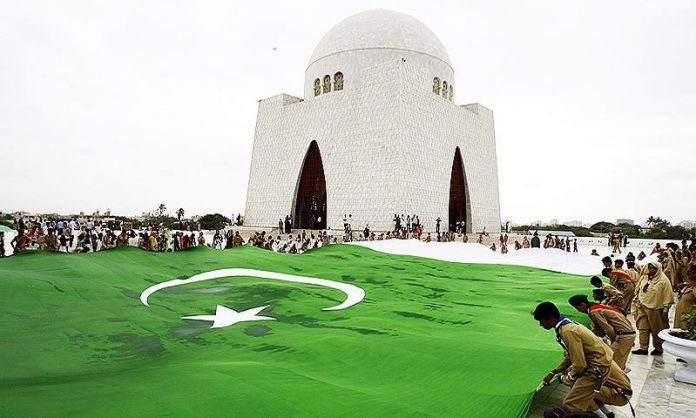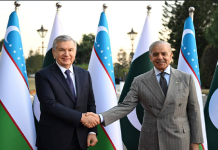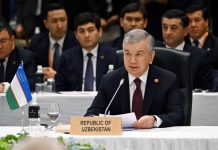By Dr Shahid Qureshi:
“There were two places (Pakistan & Palestine) where Alexander The Great faced fierce resistance in the whole world. It was Palestine and (Multan fort in Pakistan), where he was actually injured by (Pakistani soldiers) and subsequently killed”, says famous British historian Michael Wood in his documentary “In the Footsteps of Alexander the Great” on BBC.
The recent claims and denial of Saudi Prince MBS meeting with Israeli Prime Minister’s visit to Saudi Arabia has created storms in the Muslim world. Pakistani Foreign office today has categorically rejected any suggestion to recognise illegal state of Israel. What concerning is that Pakistani media persons like Kamran Khan and others ignoring the daily plight of Palestinians as some one called ‘treacherous’. This section of media reportedly has illicit foreign funding which needs to be investigated.
The question is why US and Israel are pushing Muslim countries to recognise Israeli state and have done nothing to ‘avenge’ the killings of millions of Jews in Europe? Since there were only 26 Nazis were convicted at the Nuremberg War Crimes Tribunal.
In August 2020, Prime of Pakistan Minister Imran Khan has categorically rejected any possibility that Pakistan can establish relations with Israel after it signed a historic deal with the United Arab Emirates (UAE) to normalise bilateral ties.
“Our stance is very clear from day one and Quaid-i-Azam Muhammad Ali Jinnah had said Pakistan can never accept state of Israel until the people of Palestine get rights and state,” he said in an interview with a private news channel on Tuesday.
Earlier Lady Syeda Warsi, British Minister following the tradition of Pakistani forefathers proved herself to be the bravest and courageous among the leaders in the whole Muslim world on her principle stand on the plight of the Palestinians and Genocide of Gazan’s by the Israeli forces in July 2014. The rest of the Muslim world leaders have proved to be impotent and defected. Lady Warsi came from the land where people are courageous, kind and brave to bones. The way she stood up and refused to surrender in front of the agents of ‘bankers and pawnbrokers’ will be remembered in the British political history.
It is very important that present and future leaders of Pakistan must understand that Pakistan’s commitment to Palestine was a principled one and it predated Pakistan itself. It’s support for the just causes of the Muslim world is organically related to its own national vocation.
In October 1947, soon after emergence of Pakistan, MA Jinnah aka (Quaid-i-Azam) warned that the partition of Palestine would entail “the gravest danger and unprecedented conflict and that the entire Muslim world will revolt against such a decision which cannot be supported historically, politically and morally”. Soon afterwards, Pakistan said at the United Nations that all the Holy Land was being nailed and stretched on the cross. All these words are still timely.
In 1950 (May-June) Pakistan’s first Prime Minister Liaquat Ali Khan visited the United States and American leaders of trade and industry met him. At the meeting they promised all possible military and economic assistance in case Pakistan recognized Israel. The American industrialists also underlined the importance of such a package for the new state of Pakistan. Liaquat Ali Khan in his known gentle tone replied, ‘Gentlemen! Our soul is not for sale.’
Zulifqar Ali Bhutto (1928- 1979), Prime Minister said in his keynote address to Second Summit Conference of the Islamic Heads of States held in Lahore, 18-22 February 1974, to serve as a reminder that, “Pakistan’s stand (on Palestine) was neither emotional nor ephemeral, it was based on sound principles in history, law and international legality. The stand can be betrayed. It can never be faulted”.
The Pakistan resolution passed in 1940 that inaugurated the glorious freedom struggle of the Muslims of the South Asian subcontinent under the leadership of Quaid-i-Azam Muhammad Ali Jinnah (d.1948). It is a fact of no small significance that the same session of the, [All India] Muslim League which adopted the Pakistan resolution also adopted unanimously a resolution on Palestine.
The resolution recorded that, “the considered opinion, in clear and unequivocal language, that no arrangements of a piecemeal character should be made in Palestine which are contrary in spirit and opposed to the pledges given to the Muslim world’. The resolution further warned against the danger of using force in the Holy Land to overawe the Arabs … into submission”.
Pakistan’s support for the just causes of the Muslim world is organically related to its own national vocation. It has never suffered a severance between national impulse and the urges of the Muslim emancipation. When the partition of Palestine was decided, a demonstration was held here in Lahore at which [the great Islamic poet] Iqbal [d.1938] was present. On that occasion, he emphasized the problem of Palestine, and I quote his words, `does not concern Palestine alone but will have wide repercussions in the entire Muslim world’.
Before 1947 there was no Palestine problem; there was only a country named Palestine. Only the right arrogated to itself by western colonialism enabled one western nation to promise to a section of another people, namely Jews, the country of a third, the Arabs. It needs to be reiterated that it is this fundamental injustice, this uprooting of a people from their homeland and planting alien population on it that evokes the resentment of the entire Muslim world.
The malady consists of a cancerous outgrowth of colonialism, the establishment of settler regimes or the imposition of immigrant minority rule. The root cause of the conflict is not an innate animosity between the Muslims and the Jews or even between the Arab or the Jew. Muslims entertain no hostility against any human community; when we say this, we do not exclude the Jewish people.
To Jews as Jews we bear no malice; to Jews as Zionists, intoxicated with their militarism and reeking with technological arrogance, we refuse to be hospitable. The pogroms inflicted on them during the centuries and to holocaust to which they were subjected under Nazism fill some of the darkest pages of human history. But redemption should have come from the western world and not have been exacted, as it was, from the Palestinians.
The tragedy of Palestine has agitated Muslim minds for over half a century. The outrage of its partition in 1947 and the graver injury of its occupation by Israel in 1967 have been intolerable because the territory is part of the spiritual center of the Muslim world. The Palestine question was referred to the UN at a time when the organization was hardly representative of the international community.
The partition plan of Palestine at the UN would not obtain a passing consideration today from the majority of its membership, consisting of third world nations that are sworn to the principle of self-determination of peoples. Even at that time, the Muslim nations reminded the western world of its own long-term interests and of the folly of forcibly driving a wedge into the Middle East. These reminders proved fruitless.
After 1967 war Israel became more and more arrogant; it derided the censure of its action by the United Nations. Its advocates became increasingly apathetic to the growing signs of the un-tenability of the situation arising from the war of 1967. The result was that an iniquitous, indeed and absurd, situation was frozen and the forces of sanity became immobile.
The (October 1973) war has released currents, which could flow towards a just settlement of the Middle East problem. The Arab cause has been actively supported by a vast segment of humanity. The nations of Africa have demonstrated their solidarity with Arabs and placed principle above expediency. Under the pressure of the economic forces, if not through a perception of the rights and wrongs of the situation, the western powers have awakened to the urgency of a definitive settlement of the Middle East problem. The mediatory processes, which have thus been put into, are not to be disdained.
These are good auguries. But they can vanish if an apathy towards the root of the problem, and a satisfaction at partial solutions, begins to sway the policies of those who have supported Israel. On their part, the Arab states have shown that their approach to the problem is not theological, like Israel’s, but one, which visualizes a series of peaceful adjustments beginning with disengagement. Disengagement, however, is not peace. It can turn peace into a mirage if it operates as a substitute for a comprehensive settlement.
We have a right to expect that the peace, which is negotiated in Geneva, will deal with all the issues integral to the Middle East conflict. The withdrawal of Israeli forces from all Arab territories occupied since 1967, the restoration of the Holy City to Arab sovereignty and the restitution of the rights of the Palestinian people are the essential elements of a settlement. All these elements derive from the rational principles of a just and durable peace. All of them come within the four corners of resolution 242, if that resolution is rightly interpreted.
The exponents of the Israeli view contend that the Security Council resolution envisages the possibility of Israel retaining part of the occupied Arab territories. This contention is sought to be based on the provision regarding the right of every state in the region to live in peace within secure and recognized boundaries. The perversity of such an interpretation is evident from that fact that the resolution as a whole states its objective to be the fulfilment of the Charter principles’. What principle is more basic to the Charter of the United Nations than the inadmissibility of the acquisition of territory by the use of force.
Furthermore, no state can arrogate to itself the right to determine its secure borders even if these encroach on the territory of another. No state claims such a right. The security of a state’s frontiers depends on their conformity to international law. A nation’s defense strategy is based on its recognized frontiers and not on its aggressive appetites.
Finally, the question arises: whose security comes first? Certainly, on the record of the aggressions committed by Israelis for years, it is the Arabs who need the secure borders against Israel and not Israel against the Arabs.
Among the Arab territories occupied by Israel, Al-Quds holds a special place in Muslim hearts. A unique symbol of the confluence of Islam with the sacred tradition of Abraham, Moses and Jesus, all of them Prophets whom Muslims hold in the highest reverence, Jerusalem is inscribed on our souls as the site of, in the words of the Holy Quran, `the Farther Mosque, the precinct of which Allah has blessed.’ Associated as it is with the Ascension of the Last Prophet, it is tied to our inmost spiritual fibre. Except for an interval during the Crusades, it has been a Muslim city – I repeat a Muslim city – from the year 637.
For more than 1300 years, Muslims have held Jerusalem as trust for all who venerated it. Muslims alone could be its loving and impartial custodians for the simple reason that Muslims alone believe in all three prophetic traditions rooted in Jerusalem.
We gladly recognize that Jerusalem affects the cherished sensibilities of men and women of the three world faiths. But there are over 2000 million Muslims and Christians, and only 15 million Jews, in the world. Out of these, less than three million owe their allegiance to Israel. What principle of justice would confer on this minority right to hold dominion over the Holy city? What except a kind of cynicism can allow the City of Peace to be treated by Israel as the spoils of war?
I must make it clear that is not our position on Jerusalem but Israel’s, which is contrary to the objective criteria by which the status of territories is determined. It is Israel, which cites the name of religion and culture and invokes its memories or emotions in order to lend justification to acts that are wholly illegal. Such attempts can only make a conflict implacable and bring in its train a religious war.
Viewed in non-religious perspective, the question of Jerusalem’s status cannot be unrelated to the sovereign rights of the people of Jerusalem itself, the majority of whom Arabs were, violently expelled and uprooted from the western part in 1948. Nor can the special attachment of Jewish people to Jerusalem override the principle of admissibility of territorial acquisition by force. The Jewish right to Jerusalem certainly connotes the right of access worship.
On the basis of all these considerations, the issue of the Holy City of Jerusalem admits of no doubt or division in our ranks. Let me make it clear from this platform that any agreement, any protocol, any understanding which postulates the continuance of Israeli occupation of the Holy City or the transfer of the Holy City to any non-Muslim or Arab sovereignty will be worth the paper it is written on.
This is not a threat. [But] Not to give this warning would be to encourage an illusion, which will be fatal of the establishment of lasting peace in the Middle East. In this respect, there is a fire in our hearts which no prevarication, no skilful evasions on the part of others, will ever be able to quench.
The international community and particularly those states, which sponsored the partition of Palestine in 1947, bear heavy responsibility. They have to redress the injustices perpetrated on the Palestinian people. If it were not so tragic, what could be more bizarre than the phenomenon of a people being dispossessed of its homeland and condemned to live in agony and dispersion, not in imperialism’s hoary past but in our day and age?
Those who cannot understand their anger at seeing immigrants from all over the invited, nay cajoled, to settle on their own homeland? It is not the eruptions of insensate violence, disowned by their leadership, but the purity of their rights, which must influence the world’s attitude to their problem.
The states gathered at Islamic Summit in Lahore are committed by the very fact of their adherence to the Charter of Islamic Conference to strive for restitution of the legitimate rights of the Palestinian people. This is our obligation not only to the people of the Palestine, not even merely to the cause of the Islamic brotherhood, but also to the larger cause of universal peace.
President Dr Radhakrishnan of India recounted this to a former ADC of his, Major C L Datta: “(Egyptian President) Nasser asked me when I was at Cairo airport on my way back from Ethiopia: “Why didn’t you! take Lahore [in the September 1965 war with Pakistan]? We were waiting to hear this news.”‘ Radhakrishnan, however, went on to add: `You know, I hate hiding the truth, and I just couldn’t tell him [President Nasir] that they [the Pakistanis] fought like tigers, across the Ichhogil canal.”
Pakistani pilots shot down 10 Israeli Air force jets in 1967 War.
During the so-called ‘Six Day War‘(1967), which generated American Jewish support for the Zionist entity for the first time – Pakistani pilot Saiful Azam joined tiny Jordanian Air force. On June 5, Saiful Azam engaged four Israeli jets over Jordanian Mafraq air base. He shot down a Mystére commanded by Israeli pilot H. Boleh and damaged another that crash-landed in Israeli territory. Two days later, Jordanian air force commander sent Saiful Azam to help Iraqi air force. While piloting the Iraqi Hunter Azam shot down two of the Israeli attacking planes. Pakistani pilots shot down a total of ten Israeli jets during 1967 war without losing a pilot or aircraft.
Now late Saiful Azam, native of East Pakistan – joined Bangladesh Air Force in 1971. Both the US and Israel helped India to create Bangladesh out of East Pakistan. Saiful Azam has the unique honour of the only pilot in the world who downed four Israeli jets – and served in four air forces; Pakistan, Jordan, Iraq and Bangladeshi. He also holds world record of shooting-down three kinds of military aircrafts in two different air forces.
During October 1973 Israel’s Yom Kippur war on its Arab neighbouring countries – A squadron of Pakistan’s Pakistan Air Force (PAF) arrived in Syria to fight alongside the SAF and halt the Israeli advance over the Golan Heights. The PAF pilots Sattar Alvi and Arif Mansoor, engaged and shot down an Israeli F-4 Phantom over Egyptian airspace. Another dogfight between the PAF and IAF over Syrian airspace came to a memorable end with Pakistan obliterating the Israeli Mirage IICJ flown by M. Lutz with air-to-air missiles. This was enough to convince other Israeli fighter planes to bug out and abort all further incursions into Syria.
Other Pakistani pilots who joined Syrian force as volunteers included future Air Marshal Nur Khan, Salem Metla, Shahbaz Khan, Wisaam Faris and Wisaam Shuja’at. Late President of Syria Hafiz Assad awarded two of the pilots’ country’s highest decorations for gallantry. Pakistani air force states that all its 12 volunteer pilots scored direct hits against Israeli aircrafts and suffered no losses.
During the 1973 war, Flt. Lt. A. Sattar Alvi became the first Pakistani pilot, flying a Syrian aircraft to shoot down an Israeli Mirage in air combat. Similarly, on the Egyptian front, PAF pilot Flt. Lt. M. Hatif, flying an Egyptian MiG-21 shot down an Israeli F-4 phantom in an air combat. Pakistani Air Force did not lose a single pilot or aircraft in any of the wars.
Finally, for Pakistan it can not betray the trust of the Palestinians living in Israeli occupation as it will never betray the trust of Kashmiris living under Indian occupation.
(Dr Shahid Qureshi is award winning senior investigative journalist and writer on international terrorism, security and foreign policy based in London)
Disclaimer: Views expressed are not of The London Post






